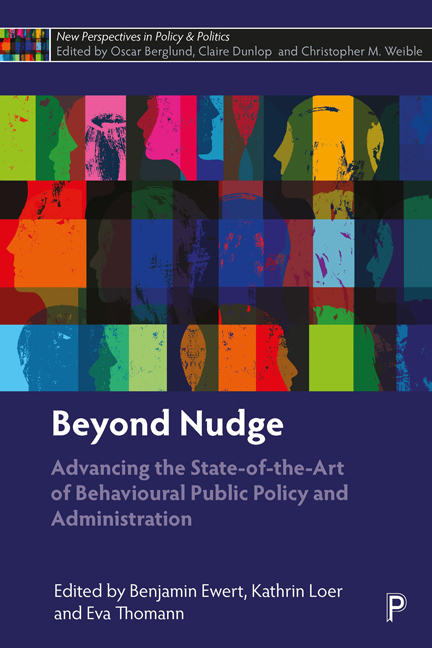Book contents
- Frontmatter
- Contents
- List of figures and tables
- Notes on contributors
- Acknowledgements
- 1 Beyond nudge: advancing the state-of-the-art of Behavioural Public Policy and Administration
- 2 Advancing behavioural public policies: in pursuit of a more comprehensive concept
- 3 A behavioural model of heuristics and biases in frontline policy implementation
- 4 Who are behavioural public policy experts and how are they organised globally?
- 5 Why nudge sometimes fails: fatalism and the problem of behaviour change
- 6 Behavioural insights teams in practice: nudge missions and methods on trial
- 7 Can street-level bureaucrats be nudged to increase effectiveness in welfare policy?
- 8 What motivates street-level bureaucrats to implement the reforms of elected politicians?
- 9 How can better monitoring, reporting and evaluation standards advance behavioural public policy?
- 10 Conclusion
- Index
5 - Why nudge sometimes fails: fatalism and the problem of behaviour change
Published online by Cambridge University Press: 28 March 2024
- Frontmatter
- Contents
- List of figures and tables
- Notes on contributors
- Acknowledgements
- 1 Beyond nudge: advancing the state-of-the-art of Behavioural Public Policy and Administration
- 2 Advancing behavioural public policies: in pursuit of a more comprehensive concept
- 3 A behavioural model of heuristics and biases in frontline policy implementation
- 4 Who are behavioural public policy experts and how are they organised globally?
- 5 Why nudge sometimes fails: fatalism and the problem of behaviour change
- 6 Behavioural insights teams in practice: nudge missions and methods on trial
- 7 Can street-level bureaucrats be nudged to increase effectiveness in welfare policy?
- 8 What motivates street-level bureaucrats to implement the reforms of elected politicians?
- 9 How can better monitoring, reporting and evaluation standards advance behavioural public policy?
- 10 Conclusion
- Index
Summary
Introduction
In focusing attention on the mechanics of behaviour change, nudge makes an important contribution to policy studies. Based on the presumption that decision-making is ‘intuitive and automatic’, Thaler and Sunstein (2008: 6) explain how small changes in the ‘choice architecture’ presented by the environment can prompt people to make better decisions, both for themselves and for society at large. By offering light-touch and low-cost policy interventions, nudge is in tune with times characterised by austerity and a suspicion of big government.
However, nudge is controversial. Among other things, critics point to three problems. The first stems from the passivity of some people who resist nudges intended to prompt more ‘enlightened’ behaviour. The second issue – paradoxically perhaps – is one of excessive suggestibility. Critics claim that some nudges (so-called default nudges) are ethically questionable to the extent that they might manoeuvre people into positions that they would not rationally adopt. Finally, in certain circumstances, researchers point to a boomerang or reactance problem that sees some people respond to nudges in the opposite of the intended direction.
This chapter suggests that progress in understanding the dysfunctions of passivity, suggestibility and reactance requires us to engage more closely with the biases guiding decision-making. Thaler and Sunstein (2008) argue that intuitive decision-making is guided by the way in which choices are framed, a tendency to optimism, a preference for the status quo, an aversion to loss and so forth. John and Stoker (2019: 214) call for a re-examination of these ‘cognitive foundations’. In place of the low-level psychological responses described by Thaler and Sunstein, they give numerous examples of the way in which nudges prompt higher-level thought processes focused on, for example, adherence to norms, reflection, developing aspirations, entering into commitments and so on (John and Stoker, 2019). In such a way, nudges operate in a similar way to traditional policy interventions in appealing to both low-and high-level thought processes (Lin et al, 2017). Of course, the problem with the established mechanisms of behaviour change is that they do not always work.
Information
- Type
- Chapter
- Information
- Beyond NudgeAdvancing the State-of-the-Art of Behavioural Public Policy and Administration, pp. 88 - 107Publisher: Bristol University PressPrint publication year: 2023
